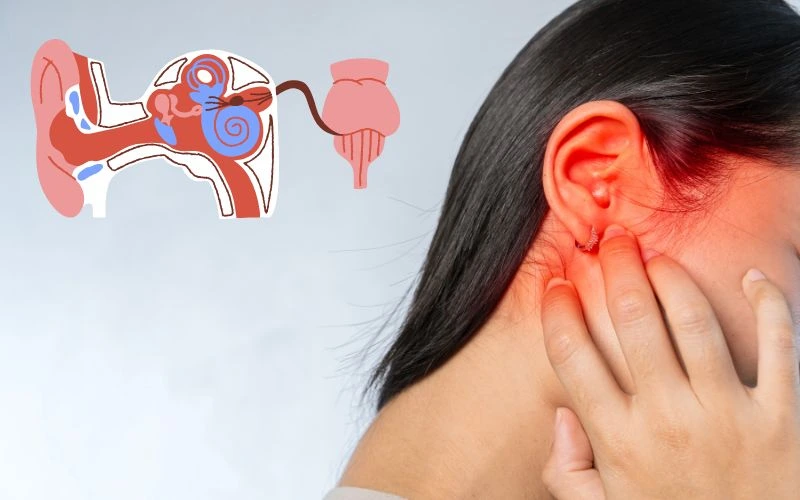Ear pain is a common but often debilitating conditions that affect daily life. Understanding why ear pain happens, ranging from infections and allergies to more severe conditions like Eustachian tube dysfunction is important. Patients can find earache relief and regain their normal hearing comfort with the proper ear treatment in Delhi—including home remedies, medicines and surgery if required for treatment. Read this blog to explore the causes of earache, available treatment options, and when to consult with an ENT specialist in Dwarka, Delhi.
5 Common Causes of Ear Pain
Ear pain can arise from various conditions, some affecting the ear directly while others involve nearby structures. Here are some top causes:
Ear Infections (Otitis Media and Otitis Externa)
Ear infections are among the most common causes of ear pain. Otitis media refers to an infection in the middle ear, which often arises from fluid buildup due to colds or allergies, leading to inflammation and pain. Otitis externa, commonly known as swimmer’s ear, affects the outer ear canal and can occur from water exposure or injury to the ear canal skin.
Eustachian Tube Dysfunction
This condition occurs when the Eustachian tubes connecting the middle ear to the back of the throat become blocked or fail to open correctly. This dysfunction leads to a pressure imbalance in the ear, causing discomfort and pain. It is often linked to colds, allergies, or sinus infections, resulting in a sensation of fullness or popping in the ears.
Sinus Infections
Sinusitis can inflame and swell the nasal passages, creating pressure that affects the ears. When sinus drainage is blocked, it can result in fluid buildup in the middle ear, potentially causing infections and pain.
Allergies
Allergic reactions can cause nasal congestion, sneezing problems and inflammation, which can block the Eustachian tubes. This blockage may lead to fluid accumulation in the middle ear, causing pain. Allergies can also increase earwax production, which may contribute to discomfort if the earwax becomes impacted.
Neurological Conditions
Certain neurological conditions can manifest as earache due to nerve involvement. For instance, trigeminal neuralgia can cause severe facial pain that radiates to the ear area. Other conditions affecting cranial nerves may also result in referred pain felt in the ears.
Symptoms Associated with Ear Pain
Ear pain can present with various symptoms, each suggesting different underlying conditions. Recognising these symptoms is important for diagnosis and ear treatment in Delhi:
- Sharp pain in the ear
- Muffled hearing
- Sense of fullness
- Fever
- Tugging or pulling at the ear
- Crying or irritability
- Loss of appetite
- Difficulty sleeping
- Headache
- Loss of balance
- Fluid drainage from the ear
10 Ear Pain Treatment Options
Ear pain can be distressing and disruptive, but many treatment options are available to decrease discomfort and address underlying causes. Understanding these options is a must for recovery.
Warm Compresses
Applying a warm compress to the affected ear provides soothing ear pain relief. The heat increases blood flow, relaxes the muscles around the ear, and may help alleviate pressure. You can use a warm washcloth or heating pad for about 20 minutes, ensuring it’s not too hot to avoid burns.
Garlic and Ginger
Natural remedies like garlic and ginger have anti-inflammatory properties that help reduce ear pain. You can apply garlic oil topically around the ear for its analgesic effects, while ginger juice may be used to soothe inflammation.
Steam Inhalation
Inhaling steam helps relieve pressure in the ears by opening up the Eustachian tubes. Using a steam inhaler or taking a warm shower allows moist air to relax the airways, reducing discomfort associated with sinus congestion or infections.
Over-the-Counter Pain Relievers
Medications such as ibuprofen (Advil) and acetaminophen (Tylenol) manage earache. These non-prescription options reduce inflammation and provide pain relief. It’s important to follow dosage instructions carefully, especially when treating children.
Essential Oils and Herbal Remedies
Natural remedies, like garlic or tea tree oil, may ease ear pain due to their antibacterial properties. A few drops of warmed garlic oil in the ear can help combat infection, while diluted tea tree oil offers anti-inflammatory benefits.
Antibiotics for Bacterial Infections
For bacterial infections, such as acute otitis media, healthcare providers may prescribe antibiotics to eliminate the infection. In India, approximately 25.78% of children suffer from acute otitis media, emphasising the importance of timely medical intervention when symptoms appear.
Prescription Medicines for pain in your ears
For severe pain that over-the-counter medications cannot relieve, healthcare providers may prescribe more potent pain relievers or anaesthetic ear drops. These medications directly target inflammation and discomfort, offering quicker relief for patients experiencing acute pain.
Corticosteroids for Inflammation
When inflammation occurs, corticosteroids may be prescribed to reduce swelling in the ear canal or middle ear. These medications treat conditions like Eustachian tube dysfunction or severe allergic reactions affecting the ears.
Myringotomy (Ear Tube Placement)
In a myringotomy, surgeons make a small incision in the eardrum to relieve pressure caused by fluid buildup or infection. Sometimes, small tubes are inserted to allow ongoing drainage and prevent future infections. This procedure is often recommended for children who experience recurrent ear infections.
Removal of Foreign Objects
Medical professionals safely remove a foreign object using specialized instruments if it is lodged in the ear canal. Prompt removal prevents infection and further complications from a retained object.
When to Seek Medical Attention
Recognising when to seek medical attention is important, as it may signal underlying conditions that require urgent ear pain treatment. Here are key signs and symptoms that indicate a visit to a healthcare professional is necessary:
- Persistent ear pain
- Fever over 101°F (38.3°C) in children, or 104°F (40°C) in adults accompanied by ear pain
- Fluid, pus, or blood discharge from the ear
- Swelling or redness around the ear
- Hearing changes
- Dizziness or balance issues
- Pain with jaw movement
- Severe headache
Ear pain should never be taken lightly. These problems can impact your daily life, and while some cases may be resolved with home remedies, others may require quick medical attention to prevent complications. Many qualified ENT specialists in Delhi & Gurgaon and facilities are ready to provide the necessary care and ear treatment in Delhi. Remember, your health is a priority, and enduring earache unnecessarily is not the solution. If you or a loved one are experiencing persistent ear discomfort, don’t hesitate to consult a healthcare center in Delhi like Doctors Hub. Relief and healing are possible, and the compassionate, expert ENT doctor in Dwarka means that you’re in good hands.













